Whole Foods’ “Responsibly Grown” Produce Ratings — Not “Good” Enough
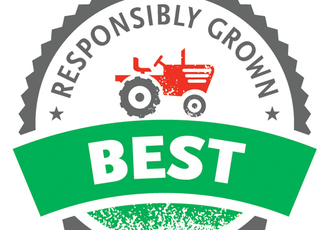 This spring 17 certified organic farmers signed on to a letter to Whole Foods Market CEO John Mackey asking him to withdraw the company’s “Responsibly Grown” produce labeling program, at least temporarily. The farmers, all of whom sell produce to the 400+-store high-end grocery chain, objected to having to pay for the grocer’s marketing program and to the fact that non-organic produce could qualify to be labeled “GOOD,” “BETTER,” or even “BEST” under the program.
This spring 17 certified organic farmers signed on to a letter to Whole Foods Market CEO John Mackey asking him to withdraw the company’s “Responsibly Grown” produce labeling program, at least temporarily. The farmers, all of whom sell produce to the 400+-store high-end grocery chain, objected to having to pay for the grocer’s marketing program and to the fact that non-organic produce could qualify to be labeled “GOOD,” “BETTER,” or even “BEST” under the program.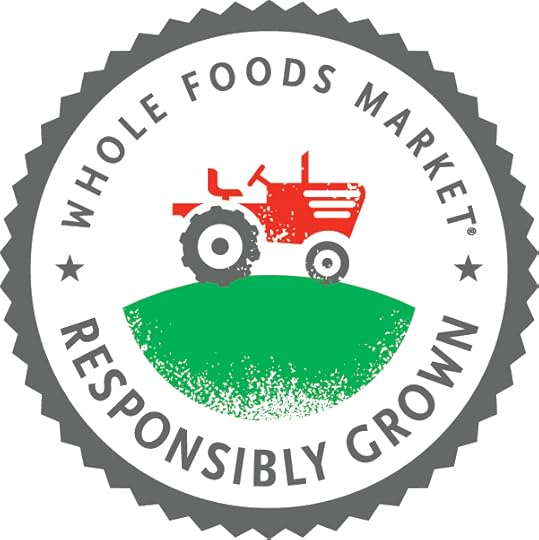
The Cornucopia Institute supported these growers, as did many other certified organic farmers and consumers around the country. It was a righteous fight – what we called “Robin Hood in reverse.” Here was a corporation, with a market capitalization exceeding $14.5 billion, asking mostly family-scale farmers, some of the best farmers in this industry, to pony up between $5,000 and $20,000 to comply with the program’s reporting requirements and, for some, purchase new equipment. That’s not an inconsequential amount for small- and medium-sized family farms. And the added record-keeping labor could crush some mom-and-pop outfits.But most of all, the farmers philosophically took exception to one corporation, hiring their own private scientist, coming up with a list of good and bad agrichemicals. Most organic consumers don’t want to pick or choose. They buy organic and they shop at stores like Whole Foods because they don’t want to treat their children like laboratory rats.
 "Especially given the image the company invests
"Especially given the image the company investsso much money in creating, Whole Foods should not be depending on journalists and industry
watchdogs, like The Cornucopia Institute, to point
out shortcomings in management oversight in the
sprawling, international chain," said Mark Kastel.Not surprisingly, researchers at The Cornucopia Institute, with PhDs in plant pathology and other related disciplines, found that a number of highly disturbing agrichemicals were not on the relatively short list of toxins that Whole Foods prohibits their top-rated conventional produce suppliers from using.So the certified organic farmers who signed the letter to Mr. Mackey had good reason to object when photos taken in several Whole Foods stores showed conventional produce being rated higher than organic, for a number of reasons.There is nothing wrong with farmers implementing good employment practices or putting solar panels on the roof of their barn – practices that win them points in Whole Foods’ rating scheme. But the prerequisite – the “ante,” if you will – to get into the Whole Foods’ Responsibly Grown game should be a supplier’s certified organic status.Quite frankly, we don’t understand how anyone who knows as much about organics as WFM founder Mr. Mackey, and the other top management at Whole Foods, could ever call conventional food the “BEST.”If you want to give extra points over and above organic status, that’s fine. But the number one employment practice that farmers should be implementing, before labeling any produce “BEST,” is to protect their workers and families, sometimes living close to farm fields, from exposure to toxic and carcinogenic chemicals.And the number one reason people are visiting Whole Foods, seeking out superior ingredients to serve their children at dinner, has nothing to do with solar panels. It has everything to do with safety, nutrition and flavor — and that’s the organic story.On July 14 CCOF, the largest organic certifier in the country, and the outfit that Whole Foods pays to secure their status as the “first national certified organic grocery chain,” announced they had brokered a deal between Whole Foods and the organic growers to placate some of the farmers' concerns.
 Whole Foods CEO John Mackey apologized for
Whole Foods CEO John Mackey apologized forrecent scandals covered by the New York Times,
New York Daily News and NPR. His blog
admitted the company's produce rating program
was launched without full management control:
"The signage is not correct."
Image source: Gage SkidmoreThe acknowledged list of problems, and commitments to address by Whole Foods, read like an indictment of a company that, at least initially, woefully failed in executing their Responsibly Grown program in an honest, trustworthy and forthright manner. Some of these include:No inspections: Unlike certified organic farmers that are subject to annual inspections and paperwork audits, the Responsibly Grown program awarded top rankings simply on the word of the farmer filling out the paperwork for the program's requirements.No oversight: Unlike independent organic certifiers like CCOF, which are directly supervised by the USDA’s National Organic Program, the Responsibly Grown program is only accountable to the executives at Whole Foods.Only the “BEST” chemicals: Congress mandated that the National Organic Program prohibit all synthetic chemicals unless carefully reviewed (in a public process) for environmental and human health safety and for being essential (meaning organic food could not be produced without them) — thus virtually none are found acceptable. Instead, at Whole Foods, a few of the bosses decided which toxic chemicals under the Responsibly Grown program would be safe for your family, the environment and farmworkers. Their new commitment is to take another look at that list.
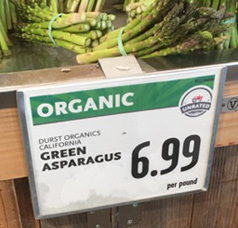 Durst organic asparagus labeled "Unrated"
Durst organic asparagus labeled "Unrated"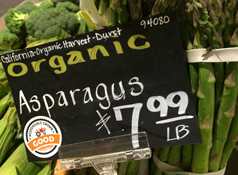 Durst organic asparagus labeled "Good"
Durst organic asparagus labeled "Good"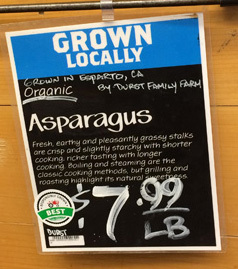 Durst organic asparagus labeled "Best"Truth in labeling? Close enough: Cornucopia members around the country documented numerous instances of labeling inconsistencies (as one example, in different stores in California one family farm had their produce labeled GOOD, BETTER and BEST). Whole Foods CEO Mackey admitted on his personal blog to labeling improprieties, including cheap Dole conventional asparagus from Mexico rated as “BEST” when he confirmed that it was “UNRATED” in their program. Their commitment now to engage in employee training is an omission of guilt. The reality is they were more interested in the marketing cachet of this program than its integrity. They had a responsibility to their customers to get the program right before rolling it out on a national basis.Good isn’t good enough: One of the main concessions the company made was discontinuing the practice of trying to intimidate certified organic farmers into participating in the program (again, at a pretty high cost) by labeling their products “UNRATED” if they would not pony up to participate. Now, in a big concession by Whole Foods, and I do say that tongue-in-cheek, organic produce will be labeled the minimum score of “GOOD” under their program. Sorry, Mr. Mackey, but I for one don’t think that giving organic growers the bottom score in your rating scheme is any great deal — and the concessions Whole Foods made, in negotiating with the growers, is only good through January 1.Talk is cheap. Whole Foods has done a lot of good by making organic food more accessible in the marketplace. At the same time, sales of conventional food account for a majority of sales in the chain's 417 stores.When I shop for groceries, the first places I head are the two member-owned co-ops I belong to. If I’m traveling and there’s no co-op around, I generally hit a Whole Foods. Like other customers, I have to shop very carefully.If you shop at Whole Foods for organics, you owe it to yourself to read the labels very, very carefully. Not everything at Whole Foods is organic! That the company describes itself as a “certified organic” grocer only means that their stores are inspected for storage, labeling and merchandising requirements. It does not mean that they are selling exclusively organic food. Far from it.As an example, in the average store, very few, if any, of the precut grab-and-go fruits and vegetables available are organic; they are overwhelmingly conventional (and pretty pricey). And at their highly profitable deli and steam tables, almost everything is conventional.They have chosen this product mix because it adds to the bottom line of the corporation. Make no mistake about it, at a time when they are under pressure by Wall Street to maintain their profitability, while other grocery chains are selling organic food at lower prices, the Responsibly Grown program is designed to convince shoppers that they are receiving better value.Gauge that value for yourself. I would suggest that you first view their product offerings through this prism: are the fresh fruits, vegetables, dairy, eggs or meat certified organic?Even under supervision from their friends at CCOF, as a certified organic retailer Whole Foods’ oversight of organic merchandising is open to question. Mr. Mackey has already admitted they do not have the management control in place to assure their own Responsibly Grown labeling scheme is being properly implemented — why should we assume that, even under CCOF oversight, they are properly displaying and labeling organics? And a recent exposé in the
New York Daily News
, on systemic problems with false weights and pricing at WFM stores, further illustrates deficiencies. [The Cornucopia Institute has formally requested the Federal Trade Commission and CCOF take a close look at the credibility of Whole Foods’ labeling practices.]We think the farmers' initial request that Whole Foods take down the signage and labeling for the Responsibly Grown program, while working to improve its credibility, was reasonable. The Cornucopia Institute will closely monitor whatever changes Whole Foods implements and report back to the organic community as to whether or not the company has turned things around enough to be considered trustworthy.Related articles
[image error]
Whole Foods Faces FTC Mislabeling Investigation
[image error]
Chef & Author Miyoko Schinner is Redefining Vegan Cheese With 10 Delicious, Authentically Cultured Varieties
[image error]
Enter this Weeks Giveaway - ORGANIC INDIA Original Tulsi Tea
[image error]
Abbott Laboratories Challenged over GMO Ingredients in Infant Formula
[image error]
Wal-Mart Declares War on Organic Farmers: Partners with Agribusiness for Corporate Takeover
[image error]
Latest USDA Scandal: Organic Program Dismisses Legal Complaints Targeting Factory Farms - Without Investigating
Durst organic asparagus labeled "Best"Truth in labeling? Close enough: Cornucopia members around the country documented numerous instances of labeling inconsistencies (as one example, in different stores in California one family farm had their produce labeled GOOD, BETTER and BEST). Whole Foods CEO Mackey admitted on his personal blog to labeling improprieties, including cheap Dole conventional asparagus from Mexico rated as “BEST” when he confirmed that it was “UNRATED” in their program. Their commitment now to engage in employee training is an omission of guilt. The reality is they were more interested in the marketing cachet of this program than its integrity. They had a responsibility to their customers to get the program right before rolling it out on a national basis.Good isn’t good enough: One of the main concessions the company made was discontinuing the practice of trying to intimidate certified organic farmers into participating in the program (again, at a pretty high cost) by labeling their products “UNRATED” if they would not pony up to participate. Now, in a big concession by Whole Foods, and I do say that tongue-in-cheek, organic produce will be labeled the minimum score of “GOOD” under their program. Sorry, Mr. Mackey, but I for one don’t think that giving organic growers the bottom score in your rating scheme is any great deal — and the concessions Whole Foods made, in negotiating with the growers, is only good through January 1.Talk is cheap. Whole Foods has done a lot of good by making organic food more accessible in the marketplace. At the same time, sales of conventional food account for a majority of sales in the chain's 417 stores.When I shop for groceries, the first places I head are the two member-owned co-ops I belong to. If I’m traveling and there’s no co-op around, I generally hit a Whole Foods. Like other customers, I have to shop very carefully.If you shop at Whole Foods for organics, you owe it to yourself to read the labels very, very carefully. Not everything at Whole Foods is organic! That the company describes itself as a “certified organic” grocer only means that their stores are inspected for storage, labeling and merchandising requirements. It does not mean that they are selling exclusively organic food. Far from it.As an example, in the average store, very few, if any, of the precut grab-and-go fruits and vegetables available are organic; they are overwhelmingly conventional (and pretty pricey). And at their highly profitable deli and steam tables, almost everything is conventional.They have chosen this product mix because it adds to the bottom line of the corporation. Make no mistake about it, at a time when they are under pressure by Wall Street to maintain their profitability, while other grocery chains are selling organic food at lower prices, the Responsibly Grown program is designed to convince shoppers that they are receiving better value.Gauge that value for yourself. I would suggest that you first view their product offerings through this prism: are the fresh fruits, vegetables, dairy, eggs or meat certified organic?Even under supervision from their friends at CCOF, as a certified organic retailer Whole Foods’ oversight of organic merchandising is open to question. Mr. Mackey has already admitted they do not have the management control in place to assure their own Responsibly Grown labeling scheme is being properly implemented — why should we assume that, even under CCOF oversight, they are properly displaying and labeling organics? And a recent exposé in the
New York Daily News
, on systemic problems with false weights and pricing at WFM stores, further illustrates deficiencies. [The Cornucopia Institute has formally requested the Federal Trade Commission and CCOF take a close look at the credibility of Whole Foods’ labeling practices.]We think the farmers' initial request that Whole Foods take down the signage and labeling for the Responsibly Grown program, while working to improve its credibility, was reasonable. The Cornucopia Institute will closely monitor whatever changes Whole Foods implements and report back to the organic community as to whether or not the company has turned things around enough to be considered trustworthy.Related articles
[image error]
Whole Foods Faces FTC Mislabeling Investigation
[image error]
Chef & Author Miyoko Schinner is Redefining Vegan Cheese With 10 Delicious, Authentically Cultured Varieties
[image error]
Enter this Weeks Giveaway - ORGANIC INDIA Original Tulsi Tea
[image error]
Abbott Laboratories Challenged over GMO Ingredients in Infant Formula
[image error]
Wal-Mart Declares War on Organic Farmers: Partners with Agribusiness for Corporate Takeover
[image error]
Latest USDA Scandal: Organic Program Dismisses Legal Complaints Targeting Factory Farms - Without Investigating
 14 Doctors Making A Difference In 2014 Treating Underlying Causes of Disease
14 Doctors Making A Difference In 2014 Treating Underlying Causes of Disease
 USDA Clips Wings of Misleading Organic Marketers
[image error]
10 Organic & Pet Friendly Weed Killer Ideas For A Healing GardenIf you enjoyed this article sign up for our FREE newsletters at http://www.thecompleteherbalguide.com
USDA Clips Wings of Misleading Organic Marketers
[image error]
10 Organic & Pet Friendly Weed Killer Ideas For A Healing GardenIf you enjoyed this article sign up for our FREE newsletters at http://www.thecompleteherbalguide.com 
Published on July 28, 2015 07:35
No comments have been added yet.
The Complete Herbal Guide (Blog)
Your health not only affects you on a daily basis it affects the people you love and care about. The Complete Herbal Guide understands that which is why we’re dedicated to being your number one go-to
Your health not only affects you on a daily basis it affects the people you love and care about. The Complete Herbal Guide understands that which is why we’re dedicated to being your number one go-to resource in your journey of health, healing, and well-being.
You can rely on us to provide quality content with the intent to help you improve your health and prevent any illnesses from occurring. We care and because of that, we make it our top priority to support, advise, and motivate you so you can live a happy, healthy, and productive life. Why? Because you deserve it and so do your family, friends, caregivers, and loved ones.
https://thecompleteherbalguide.com/
...more
You can rely on us to provide quality content with the intent to help you improve your health and prevent any illnesses from occurring. We care and because of that, we make it our top priority to support, advise, and motivate you so you can live a happy, healthy, and productive life. Why? Because you deserve it and so do your family, friends, caregivers, and loved ones.
https://thecompleteherbalguide.com/
...more
- Stacey Chillemi's profile
- 9 followers



